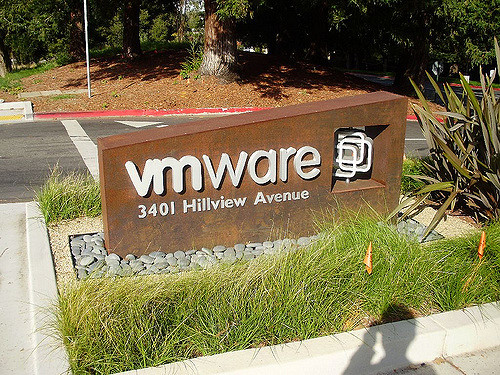VMWare Eyeing Containers

Photo Credit: sporst/Flickr.com.
Virtualization giant VMWare (NYSE: VMW) recently announced a stellar first quarter that beat estimates. VMWare dominates the virtualization infrastructure market with a 91% share and now it is looking to bolster its containers and security capabilities.
VMWare’s Financials
VMware’s first quarter revenues grew 13% over the year to $2.27 billion versus the Street estimate of $2.24 billion. Non-GAAP EPS was $1.32, ahead of the Street’s forecast of $1.28. Net income was $505 million or $1.21 per share compared with $942 million or $2.29 per share a year ago.
By segment, license revenues grew 12% over the year to $869 million and services segment grew 13% to $1.4 billion for the quarter. Hybrid Cloud and SaaS accounted for over 12% of total revenues and grew 35% over the year.
VMware is maintaining its full-year fiscal 2020 guidance, including total revenue of $10.03 billion, GAAP operating margin of between 21.4% and 22.8% and non-GAAP operating margin of 33%. Analysts expect earnings of $6.53 per share on revenue of $10.02 billion.
VMWare’s Acquisitions and New Offerings
VMware recently acquired leading package application company Bitnami for an undisclosed amount. It has one of the largest catalogs of click-to-deploy applications and development stacks for major cloud and Kubernetes environments. San Francisco-based Bitnami’s annual revenue is estimated to be $5 million and it competes with ElasticBox, LogRocket, and DigitalOcean. It had raised funding of $1.1 million in a seed round in 2013.
Last year, VMWare acquired another Kubernetes player, Heptio for an estimated $550 million. Founded in 2016, Seattle-based Heptio was set up by the founders of the Kubernetes project to support and advance the open Kubernetes ecosystem. It provided professional services for organizations using or planning to use Kubernetes. Prior to the acquisition, Heptio had raised $33.5 million in funding with its last funding round valuing it at $117 million.
Hepptio has been integrated into VMware Essential PKS platform, which has been recently been made generally available. PKS streamlines DevOps workflows and takes advantage of new networking, security, and automation features designed for Kubernetes (K8s) at scale.
Last week, VMWare announced its plans to purchase Avi Networks, a multi-cloud application delivery company for an undisclosed amount. The deal is expected to strengthen VMWare’s security platform NSX. Avi already integrates with VMware NSX and VMware vCenter and is expected to be offered as part of VMware NSX Data Center, and an advanced, standalone ADC.
Santa Clara-based Avi Networks was founded in 2012 and has raised $115 million in funding. It is estimated to have annual revenue of $2 million and competes with Cloudflare, Imperva Incapsula, and Kemp.
At the RSA Conference, VMware introduced the VMware Service-defined Firewall for internal firewalling to reduce the attack surface for on-premises and cloud environments. It also updated VMware NSX-T Data Center 2.4 and NSX Cloud, expanding capabilities for enterprise customers’ and communications service providers’ adoption of Network Function Virtualization (NFV). VMware recently introduced VMware Cloud on Dell EMC to provide simple, more secure and scalable infrastructure delivered as-a-service to customers’ on-premises data center and edge locations.
With the help of partnerships, VMware is gaining momentum as the glue between all networking environments. VMware Cloud on AWS is now available in 14 regions globally. Microsoft will now deliver fully native, supported, and certified VMware cloud infrastructure on Microsoft Azure called Azure VMware Solutions. VMware Workspace ONE will manage Office 365 across devices via cloud-based integration with Microsoft Intune and Azure Active Directory and the extension of VMware Horizon Cloud on Azure to include Microsoft Windows Virtual Desktop.
While the server virtualization market is saturated, it remains to be seen if VMWare’s recent moves into containerization and security will bear fruit in the long run.
Given its focus on containers, should VMWare acquire the leading container startup Docker? Docker has an estimated revenue of $55 million and has so far raised $272 million. It was last valued at $1.3 billion in funding round for $75 million in 2017.
Its stock is trading at $171.85 with a market capitalization of $70.3 billion. It touched a 52-week high of $206.8 last month soon after the Bitmani acquisition announcement. It was trading at a 52-week low of $129.33 in January this year.
(Click on image to enlarge)



